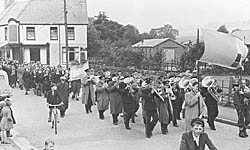Communities - Activities
 Voluntary organisations flourished to a remarkable extent
in the slate quarrying areas, cultural, sporting, political and
religious. One doctor claimed that one reason for quarrymen's
poor health was that they were rushing to some committee or another
every evening: chapel activities, choir practice,
football, billiards, band, trade union Friendly and Benefit
Society or Liberal organisations. Of all these, it was the chapel
that watched over and shaped society so much. Each chapel was a
hive of activity, and not only on a Sunday. The vast Capel
Jerusalem at Bethesda in 1900 had a weekly timetable that ran
thus: Voluntary organisations flourished to a remarkable extent
in the slate quarrying areas, cultural, sporting, political and
religious. One doctor claimed that one reason for quarrymen's
poor health was that they were rushing to some committee or another
every evening: chapel activities, choir practice,
football, billiards, band, trade union Friendly and Benefit
Society or Liberal organisations. Of all these, it was the chapel
that watched over and shaped society so much. Each chapel was a
hive of activity, and not only on a Sunday. The vast Capel
Jerusalem at Bethesda in 1900 had a weekly timetable that ran
thus:
| Day |
Time |
Event |
| Sunday |
09.00 am |
Prayer Meeting for the
young |
|
10.00am |
Sermon |
|
02.00pm |
Sunday School |
|
05.00pm |
Singing
Meeting |
|
06.00pm |
Sermon |
| Monday |
|
Prayer Meeting |
| Tuesday |
|
Church Organisational
Meeting |
| Wednesday |
|
Five Study
Meetings |
|
|
Literary
Society |
| Thursday |
|
Four Study
Classes |
| Friday |
|
Band of Hope |
|
|
|
Very little serious crime occurred, and what little there was
dominated by drunkenness. Even though temperance and total
abstinence were important influences in the community, there was an abundance of public houses standing cheek by jowl in the high street of
both Bethesda and Blaenau Ffestiniog. Street fighting and
brawling were not uncommon, and neither was poaching. Indeed, the chapels themselves disciplined any promiscuous
behaviour that might arise. It was against this background that
industrial unrest developed especially after 1865.
![Masthead of `Y Drych', a newspaper published for the Welsh community in the United States, 22 September 1881. [University of Wales, Bangor]](images/PT0000248.jpg)
|